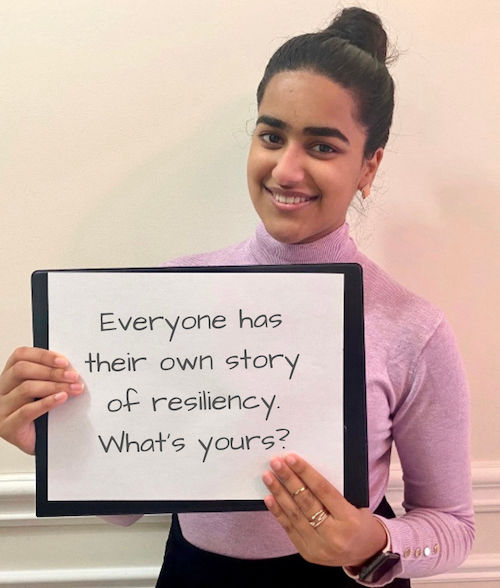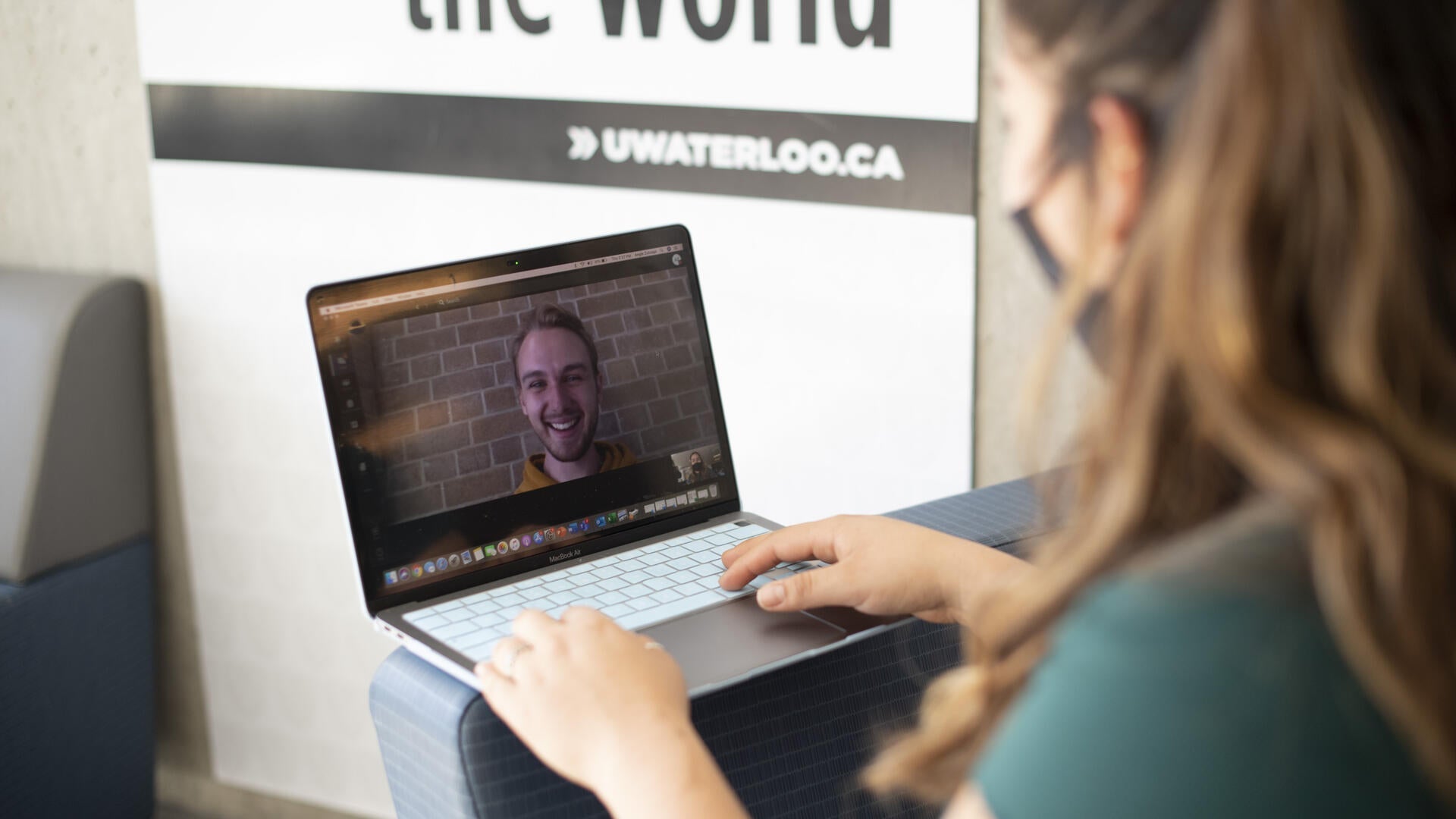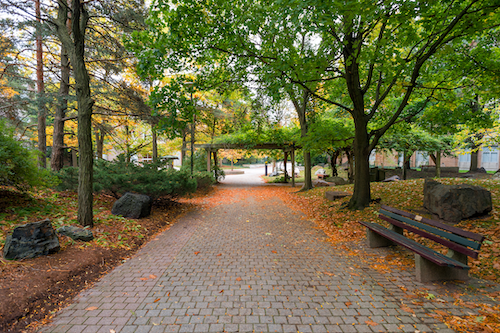Editor:
Brandon Sweet
University Communications
bulletin@uwaterloo.ca
Everyone has a story of resilience. What's yours?

As a first-year student, Bakhtawar Khan experienced academic failure for the first time. She failed a chemistry midterm and was shocked.
“I felt like I was the only one who had failed the midterm and … I was really embarrassed and didn’t want to hear that I’d have to take the course again or that I wasn’t good enough.”
She was scared but reached out to her professor for support. Her professor reassured her that chemistry is tough for a lot of people and that she should never be afraid to ask a professor for help. Bakhtawar says this experience taught her to embrace change and learn from her mistakes.
Bakhtawar’s story and many others that highlight the resilience of our community can be found on the UW Resilient webpage. Resilience is “a process of using internal and external resources to manage challenging circumstances”. Resilience is a process that looks different for everyone. It often requires internal protective factors like hope, optimism, self-compassion, and external protective factors like a sense of belonging and others’ belief in your abilities.
We are looking for more stories, please consider sharing yours. At a time when we are physically distanced from each other, this campaign helps to bring us closer together by sharing stories of challenge, failure, and resilience and contributes to a culture where challenges, adversity and failure are normalized and expected as part of the post-secondary experience. This campaign is one of the initiatives from the Resiliency Working Group, whose goal was completion of recommendation 21 from the President’s Advisory Committee on Student Mental Health.
Study finds three factors key to remote work experience for young people

This article originally appeared on Waterloo Stories.
Researchers have identified three factors that are important to young people who work from home during the coronavirus pandemic: socialization, productivity, and meaningful work.
A team of researchers from the University of Waterloo’s Work-Learn Institute determined these factors are vital for young people in a remote work setting for them to be successful. As the organizations focus on their pandemic recovery plans, it is critical they understand how to engage the next generation of talent productively in remote work.
“It was important to undertake this research to understand the impact of the COVID-19 pandemic through the eyes of co-op students who made the transition to work from home,” said Judene Pretti, Director of the Work-Learn Institute and lead author on the study. “We wanted to see how their experiences as young professionals might differ from the general workforce.”
As a result of COVID-19, thousands of young people who were engaged with organizations around the globe transitioned to working from home, with little-to-no time to prepare.
Semi-structured interviews were conducted via video conference with 50 Waterloo co-op students to determine their perceptions on working remotely during the early stages of the pandemic. Attention was paid to the skills important to success for students in remote working, the challenges they faced, and recommendations they had for future WIL experiences.
Through the study, students noted positives and negatives associated with working remotely. Though abrupt, many students reported a smooth transition to remote working, while its ease was motivated by initiative, support provided by employers and similarity to responsibilities in the office versus at home.
Pretti said 87 per cent of students reported a positive transition to working from home and acknowledged the role their employers played in helping them make the transition.
“We learned that students appreciated many of the aspects of remote working that other workers report: increased autonomy and flexibility,” Pretti said. “We also learned that they particularly missed the informal and social aspects of connecting with colleagues in a workplace setting, and in some cases felt that they could be more productive and could make a more meaningful contribution.”
Flexibility in hours, a relaxed dress code, and an increased sense of independence were other positives shared by students regarding remote work. Challenges included missing out on collaborative opportunities in the workplace and technical difficulties, especially during initial set-up.
In succeeding in their work term, students cited maintaining regular communication to provide a sense of connection (socialization), flexibility and adaptability (productivity), and value of their work (meaningful work) as important factors for remote WIL.
The research paper, “Remote work-integrated learning experiences: Student Perceptions,” is presented in the International Journal for Work-Integrated Learning and can be accessed in full here.
Q and A with the experts: remembering 2020, digitally
The University of Waterloo has a number of experts available for comment on various aspects of the COVID-19 pandemic.

When the global pandemic was declared, people immediately began to turn to historians of the Spanish flu of 1918 to understand and learn from those experiences.
How will the world learn about the COVID-19 pandemic?
History Professor Ian Milligan, who specializes in digital records, explains why it’s so important to archive our online world, and what it will mean for future scholars.
Why is preserving the digital history of the pandemic so important?
As we all live through 2020, it seems like a historic moment: between the COVID-19 pandemic, and ongoing protests on a nearly unprecedented scale against racism and police brutality around the world, every day seems to bring new and occasionally overwhelming torrents of information.
Most of us learn of this through digital media: we refresh social media streams, laugh at memes, “doomscroll” our way through ever-refreshing pages at night, check the COVID-19 case counts every morning, and – for others – have seen our work, teaching, and socialization shifted to digital platforms.
What will our children (or even us in a decade or two) remember of these events? What sources will they use? To ensure that future generations understand what 2020 was like, we need to preserve a comprehensive digital record of what’s around us.
How do we, as a society, undertake this huge project? Are individuals responsible for helping?
Individuals can certainly help! If you see something online that you think should be preserved, provide the address to the Internet Archive by visiting https://archive.org/web/ and pasting it into the “Save Page Now” box. That will preserve a “snapshot” of the page. Next time you see an insightful meme, think about adding it!
However, this sort of individual activity is no replacement for concerted action by institutions. For example, Library and Archives Canada has been “harvesting” Twitter hashtags and is regularly collecting 900 websites. Complementing this activity is a large array of activity by other archives who are capturing local experiences (such as here at Waterloo).
Yet we need even more coordination and funding for this sort of work. Too many libraries and archives harvest these breaking digital records as an afterthought, or as part of an already over-loaded job. Our digital record is so central, as we see here in 2020, that we as a society need to invest in this capacity so that our archivists and librarians can do their job even better.
How will future scholars use this information?
The digital record that we are generating today is going to allow us to write histories that draw on millions of voices. Just imagine: a historian in twenty years could draw on tweets from people debating mask mandates or the merits of social distancing restrictions; continually-updated government websites; hundreds of thousands of photos, videos, and beyond from protests that have unfolded throughout the year.
This opportunity is balanced by the challenge of making all of this information meaningful and useful. It will require new ethical approaches, an understanding of contextual clues to distinguish genuine users from bots, as well as interdisciplinary collaboration between historians, library and information scholars and computer scientists. Indeed, since 2017, this has been a major focus of our Archives Unleashed Project; supported by The Andrew W. Mellon Foundation, we’re trying to make sure the tools are there for historians and others interested in exploring this record.
Ian Milligan is an associate professor of history at the University of Waterloo. His primary research focus is on how historians can use web archives, as well as the impact of digital sources on historical practice more generally.
A roundup of reading week readjustments

Joe Petrik of the School of Computer Science took this picture of a quiet campus in the throes of fall this weekend.
It's Fall Reading Week this week, which means campus will be quieter than usual, except for the geese who are no doubt congratulating themselves on not being as edible as Thanksgiving turkeys. Some campus operations have limited hours as follows:
Print + Retail Solutions operations for Tuesday, October 13 to Friday, October 16 are as follows:
- W Store | Gifts + Apparel (SCH): 9:00 a.m. to 4:00 p.m.
- W Store Essentials, SLC: 11:00 a.m. to 3:00 p.m.
- W Print SCH: 9:00 a.m. to 4:00 p.m.
Curbside pickup services are closed this week.
All Food Services locations are closed this week, with the exception of The Market at UWP in Claudette Millar Hall.
Plant Operations has announced that an elevator in East Campus 5 (EC5) will be down for routine maintenance on Tuesday, October 13 from 8:00 a.m. to 4:00 p.m.
Plant Operations has also announced that an exhaust unit atop the Mike & Ophelia Lazaridis Quantum-Nano Centre will be replaced on Saturday, October 17, with a rain date of October 18, which requires a complete building lockdown from 6:00 a.m. to 8:00 p.m.
The entire building will be closed and inaccessible while the exhaust unit replacement is carried out, and there will be a closure of the Ring Road between the Physical Activities Complex's lower parking lot and the entrance to the Needles Hall parking lot to make room for the crane and support vehicles during the operation.
Link of the day
40 years ago: Thundarr the Barbarian
When and Where to get support
Students can visit the Student Success Office online for supports including academic development, international student resources, leadership development, exchange and study abroad, and opportunities to get involved.
Instructors can visit the Keep Learning website to get support on adapting their teaching and learning plans for an online environment. The following workshops are current offerings from the KL team (CTE, CEL, ITMS, LIB):
Getting Ready to Facilitate Online Courses: TA Training, beginning Tuesday, October 13.
Remote Course Design Essentials, beginning August 26.
Independent Remote Course Design Essentials. Self-directed, continuous self-enrollment course in LEARN.
Getting Ready to Facilitate Online Courses: TA Training, Tuesday, October 13 to November 10.
Thirty Minute Thursdays – PebblePad, Thursday, October 15, 12:00 noon to 12:30 p.m.
Supporting Student Mental Health (for Instructors): self-directed, continuous self-enrollment course in LEARN.
Employees can access resources to help them work remotely, including managing University records and privacy of personal information.
Interested in learning more about engaging your students in an online course? The Centre for Extended Learning has created a new resource for you called "Fostering Engagement: Facilitating Online Courses in Higher Education"
ThisOpen Educational Resource was designed for post-secondary instructors and teaching assistants who would like to better understand the critical role of facilitation in online course delivery, and build practical skills and strategies that are relevant, effective, and authentic.
Here are some tips for staying healthy while working from home.
The Writing and Communication Centre is rolling out virtual services and programs for fall term:
- Undergrad students -- work with us to brainstorm, draft, revise, and polish assignments by meeting with our writing advisors in virtual appointments. Chat with our friendly and knowledgeable peer tutors in our virtual drop-ins and PJ-friendly writing groups. Or experience an online workshop at your own pace.
- First-year Warriors! Check out Waterloo Ready to Write to build your skills for writing success.
- Graduate Students -- meet with an advisor in a virtual appointments, take an online workshop, join the grad writing community at our Virtual Writing Cafés and #WaterlooWrites groups, develop your academic voice at Speak Like a Scholar, or make progress on your thesis at Dissertation Boot Camp.
- Instructors and faculty -- Request and access WCC workshops for use in your courses, join a virtual writing group, or speak with a writing advisor about a writing project.
We understand that these circumstances can be troubling, and you may need to speak with someone for emotional support. Good2Talk is a post-secondary student helpline based in Ontario, Canada that is available to all students. If you feel overwhelmed or anxious and need to talk to somebody, please contact the University’s Campus Wellness services, either Health Services or Counselling Services. You can also contact the University's Centre for Mental Health Research and Treatment.
The Library has published a resource guide on how to avoid information overload.
The Faculty Association of the University of Waterloo (FAUW) continues to advocate for its members. Check out the FAUW blog for more information.
The University of Waterloo Staff Association (UWSA) continues to advocate for its members. Check out the UWSA blog for more information.
WUSA supports for students:
Food Support Service food hampers are currently available from the Turnkey Desk on weekdays from 9:00 a.m. to 4:00 p.m. in the Student Life Centre. If you have any questions please email us at foodsupport@wusa.ca.
The Bike Centre – Now open by appointment for your bicycle repair and rental needs in the Student Life Centre. For more information or to schedule an appointment, please go to: https://wusa.ca/bikecentre
Centre for Academic Policy Support - CAPS is here to assist Waterloo undergraduates throughout their experience in navigating academic policy in the instances of filing petitions, grievances and appeals. Please contact them at caps@wusa.ca. More information at http://wusa.ca/caps
WUSA Commissioners who can help in a variety of areas that students may be experiencing during this time:
- Equity – equity@wusa.ca
- Co-op and Experiential Affairs – coop.affairs@wusa.ca
WUSA Student Legal Protection Program- Seeking legal counsel can be intimidating, especially if it’s your first time facing a legal issue. The legal assistance helpline provides quick access to legal advice in any area of law, including criminal. Just call 1-833-202-4571.
Empower Me is a confidential mental health and wellness service that connects students with qualified counsellors 24/7. They can be reached at 1-833-628-5589.
When and Where (but mostly when)
Healthy Warriors at Home. Free programming including Online Fitness, Health Webinars, Personalized Nutrition and more from Warriors Athletics and Rec. Open to students, staff, faculty and alumni. Register today.
Renison English Language Institute continues to offer virtual events and workshops to help students practice their English language skills.
Fall Reading Week, Saturday, October 10 to Sunday, October 18.
NEW - Thanksgiving holiday, Monday, October 12, most university operations closed.
Grammar Studio III: Clarity at the Sentence Level Live Q&A, Tuesday, October 13, 9:00 a.m.
Dissertation Boot Camp, Tuesday, October 13 to Friday, October 16.
Anti-Racism Workshop: Understanding Racism & Racial Microaggressions within the University Context, hosted by the Equity Office and facilitated by Dr. Gauthamie Poolokasingham, Wednesday, October 14, 1:00 p.m to 4:00 p.m.
Portage-Global Water Futures Research Data Management webinar series: “5 Reasons Why You Should Know the CaSPAr and CUIZINART,” Wednesday, October 14, 1:00 p.m. Registration details are available here.
Concept Intro Session: Customer Discovery, Wednesday October 14, 5:00 p.m., Virtual Event.
First Virtual Research Colloquium: Call For Papers/Abstract Deadline Extension. Graduate students are invited to submit papers/abstracts for a chance to be awarded up to $500. New deadline for submissions is Thursday, October 15. Hosted by the University of Strathclyde and the University of Waterloo.
WaterTalk: Riverscapes and Lifeways - Biocultural Diversity and River Flow Management, Thursday, October 15, 10:00 a.m. to 11:00 a.m.
Anti-Blackness at the Intersections Workshop, hosted by the Equity Office and facilitated by Rania El Mugammar, Thursday, October 15, 1:00 p.m. to 3:00 p.m.
Supporters of Survivors Workshop, with Sexual Assault Support Centre of Waterloo Region, Thursday, October 15, 7:00 p.m. to 9:00 p.m.
NEW - Graduate Studies Endowment Fund project application deadline, Friday, October 16. Email gsef@uwaterloo.ca if you have any questions.
NEW - Giving Bad News Workshop, hosted by the Conflict Management & Human Rights Office, facilitated by Joseph Pazzano, Friday, October 16, 10:00 a.m. to 12 noon.